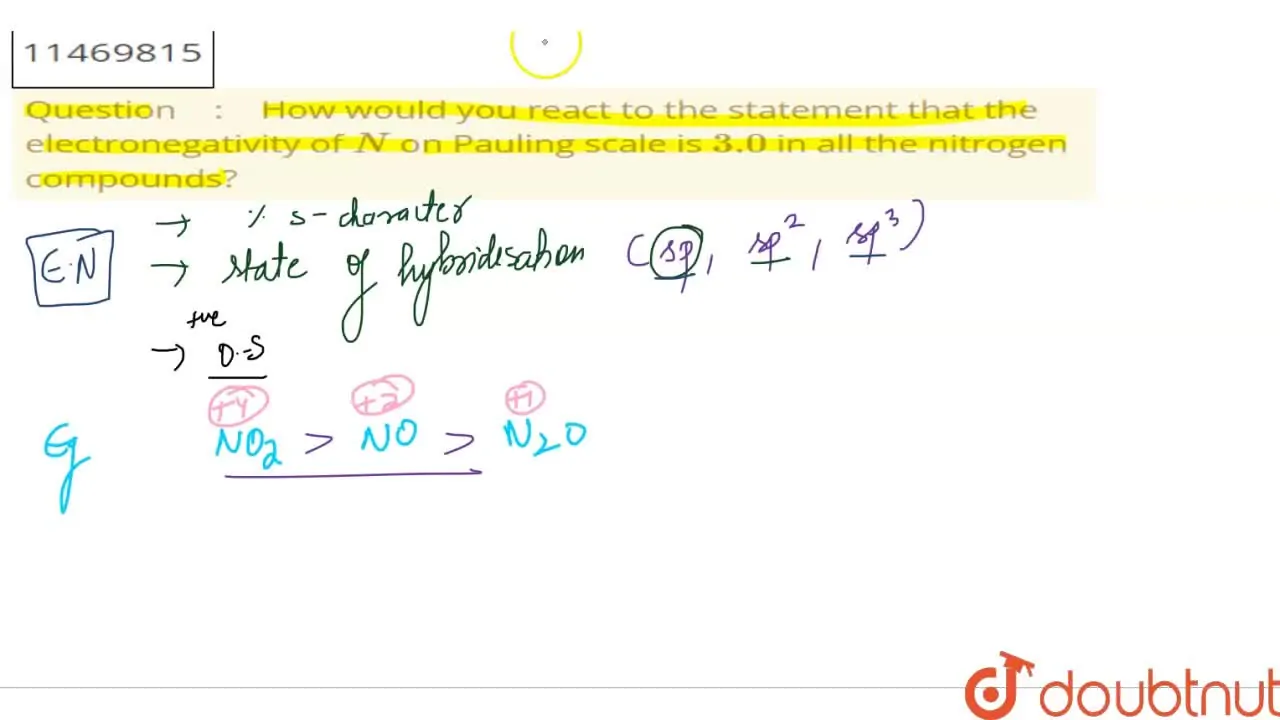How would you react to the statement that the electronegativity of N on Pauling scale is 3.0 in all the nitrogen compounds?
The EN of any given atom is not constant. Therefore, the statement that the EN of N on Pauling scale is 3−0 in all nitrogen compounds is not correct. Actually, EN varies with the state of hybridisation and the oxidation state of the element and the number and nuture of substituent attached to it. The EN increases as the percentage of s−character of a hybrid orbital increases or the oxidation state of the element increases. For example, the EN of N increases as we move from sp3→sp2→sp-hybrid orbital. Similarly, the EN of N in NO2 where oxidation state of N is +4 is higher than in NO where the oxidation state of N is +2 and EN of N in N2O is +1. Thus EN of N in NO2>NO>N2O.
Related Playlists
- BOOK - CENGAGE CHEMISTRYCHAPTER - APPENDIX - INORGANIC VOLUME 1EXERCISE - Exercise very short70videos
APPENDIX - INORGANIC VOLUME 1
- BOOK - CENGAGE CHEMISTRYCHAPTER - APPENDIX - INORGANIC VOLUME 1EXERCISE - Exercise Short146videos
APPENDIX - INORGANIC VOLUME 1
- BOOK - CENGAGE CHEMISTRYCHAPTER - ALKYNESEXERCISE - Exercises (Archives - Analytical and Desriptive Type)4videos
ALKYNES
- BOOK - CENGAGE CHEMISTRYCHAPTER - ATOMIC STRUCTUREEXERCISE - Concept Applicationexercise(4.3)19videos
ATOMIC STRUCTURE
Similar Questions
How would you react to the statement that the electronegativity of N on Pauling scale is 3.0 in all the nitrogen compounds?
View SolutionHow would you react to the statement that the electronegativity of C on Pauling scale is 2.5 in all the carbon compounds?
View SolutionElectronegativity of F on Pauling scale si 4.0 Calculate its value on Mulliken scale .
View SolutionThe electronegativity values of C,N,O and F on Pauling scale:
View SolutionCorrect order of electronegativity of N,P,C and Si on Pauling scale is:
View SolutionSelect the incorrect statement(s)
IE(I) of nitrogen atom is less than IE(I) of oxygen atom.
Electron affinity of oxygen is less than selenium atom
Electronegativity on Pauling scale is "2.8" times greater than electronegativity on Muliken scale.
The Cr6+ is smaller than Cr3+View SolutionCalculate the ionization energy in eV/atom) of fluorine if its electronegativity on Pauling's scale is 4 and its electron gain enthalpy is -3.4 eV/atom.
(Add the digits till you get single digit answer.)View SolutionCalculate the ionization energy in eV/atom) of fluorine if its electronegativity on Pauling's scale is 4 and its electron gain enthalpy is -3.4 eV/atom.
(Add the digits till you get single digit answer.)View SolutionCalculate the ionization energy in eV/atom) of fluorine if its electronegativity on Pauling's scale is 4 and its electron gain enthalpy is -3.4 eV/atom.
(Add the digits till you get single digit answer.)View SolutionHow would you separate nitrogen and oxygen from air ?
View Solution


